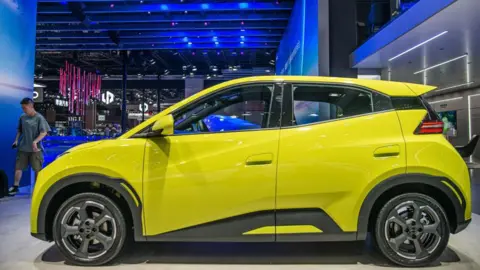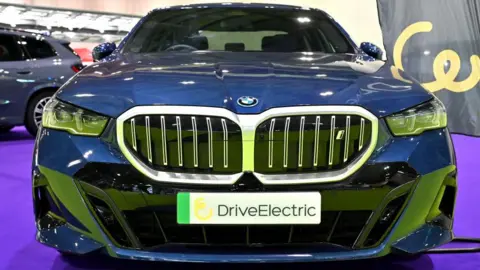The EU is expected to hit Chinese electric cars with tariffs
By Theo Leggett, BBC international business correspondent
 Getty Images
Getty ImagesWith China accused of selling electric cars at artificially low prices, the European Union is widely expected to hit them with tariffs this week.
The BYD Seagull is a tiny, cheap, neatly styled electric vehicle (EV). An urban runabout that won’t break any speed records, but nor will it break the bank.
In China, it has a starting price of 69,800 yuan ($9,600; £7,500). If it comes to Europe, it is expected to cost at least double that figure due to safety regulations. But that would still be, by electric car standards, very cheap.
For European manufacturers that is a worrying prospect. They fear the little Seagull will become an invasive species, one of a number of Chinese-built models poised to colonise their own markets at the expense of indigenous vehicles.
China’s domestic auto industry has grown rapidly over the past two decades. Its development, along with that of the battery sector, was a major component of the “Made In China 2025” strategy, a 10-year industrial policy launched by the Communist Party in Beijing in 2015.
The result has been the breakneck development of companies like BYD, now vying with Tesla for the title of the world’s biggest manufacturer of electric vehicles. Established giants such as SAIC, the owner of the MG brand, and Volvo’s owner Geely, have also become big players in the EV market.
Last year, more than eight million electric vehicles were sold in China – about 60% of the global total, according to the International Energy Agency’s annual Global EV Outlook.
For policymakers in Europe and the US, however, this is a cause for concern. With Chinese brands having plenty of surplus capacity and moving into international markets, they fear their own companies will be unable to compete. They claim hefty subsidies for domestic production allow Chinese firms to keep prices at a level other firms will struggle to match.
According to a report by the Swiss bank UBS, published in September, the Chinese advantage is real. It suggested that BYD could produce cars at some 25% lower cost than the best of the legacy global carmakers.
It said BYD and other Chinese firms were “set to conquer the world market with high-tech, low-cost EVs for the masses”.
Meanwhile, earlier this year, the Alliance for American Manufacturing warned that the introduction of cheap Chinese cars could be an “extinction-level event” for the US auto industry. It called for a “dedicated and concerted effort to turn those imports back”, concluding that there was “no time to lose”.
Last month, the US took decisive action. The Biden administration raised its tariff on imports of Chinese battery-powered cars from 25% to 100%. Sales of Chinese-made EVs in the US are currently negligible; with the new tariffs, they are likely to stay that way.
The move was part art of a wider package of measures targeting imports from China that has been condemned by Beijing as “naked protectionism”.
At the same time, the US is subsidising its own car industry, through tax incentives that make domestically-produced vehicles cheaper to buy.
The EU appears to be taking a more moderate approach, despite tough rhetoric.
In her state of the Union address in September last year, the European Commission president Ursula von der Leyen announced an investigation into Chinese imports.
“Global markets are now flooded with cheaper Chinese electric cars,” she said.
“Their price is kept artificially low by huge state subsidies. This is distorting our market.”
The initial results of that investigation are now imminent.
It is widely expected that the Commission will provisionally raise duties on EVs imported from China, from the standard level of 10% for third country imports to between 20 and 25%.
 Getty Images
Getty ImagesAccording to Matthias Schmidt of Schmidt Automotive Research, this would be a rather more proportionate response than the US move.
“The 100% tariff is just pure protectionism, regressive and stifles innovation, and prevents a competitive landscape for the consumer,” he says.
“If the EU imposes tariffs of no more than 25%, it will be more about levelling the playing field, and evening out the 30% cost advantage Chinese manufacturers have.”
Nevertheless, tariffs could hurt European companies as well as helping them.
Firstly, they would not just affect Chinese brands. For example, BMW’s iX3 electric SUV is built at a factory in Dadong and exported to Europe. The company also intends to import large quantities of Chinese-made electric Minis.
Both models would be subject to the tariffs, leaving the manufacturer to absorb the extra cost, or raise prices. The US manufacturer Tesla would also be affected, as it builds cars in Shanghai for export to Europe.
Secondly, although European makes have invested heavily in production in China in recent years, in partnership with local manufacturers, a number of them still export high-value models to Chinese markets.
If China wanted to retaliate by imposing its own hefty tariffs, these shipments could be targeted.
 Getty Images
Getty ImagesSmall wonder then, that executives at European carmakers have been distinctly lukewarm about the EU’s initiative.
Earlier this year, Volkswagen Group’s chief executive Oliver Blume warned that the introduction of tariffs was…
Read More: The EU is expected to hit Chinese electric cars with tariffs
2024-06-11 01:36:52

